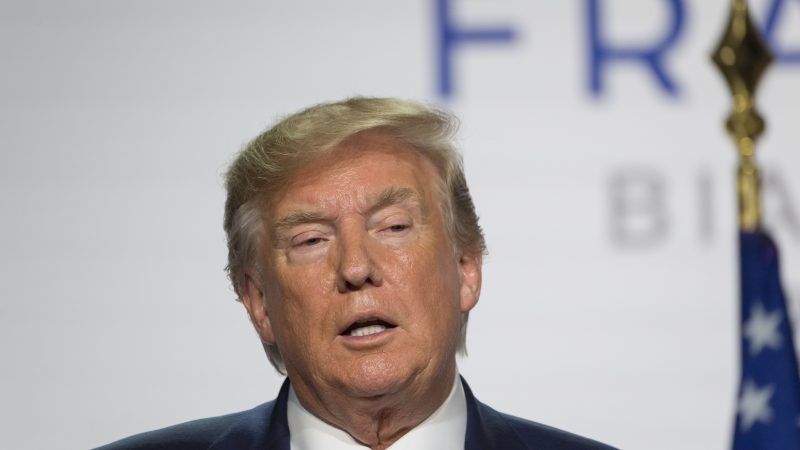The Price of an Erratic President
Even if Trump doesn’t follow through on his bad ideas, the uncertainty is still a drag.

Perhaps the strangest thing about the story that President Donald Trump has expressed interest in using nuclear bombs to stop hurricanes was that it didn't seem all that strange. Almost no one thought to ask "Can you believe it?" because almost everyone automatically did, while simultaneously acknowledging that in reality, no such intervention would be tried.
So instead of sustained incredulity, there were jokes, and a few #WellActuallys, and eventually Trump himself declared that the story was fake news. But for the most part, the story, first reported by Axios, came and went with the daily tides of Twitter conversation. Trump wants to deploy nuclear weapons to stop summer storms? Wild stuff! 2019, right? Moving on.
One way to understand this is as a basically healthy reaction to the brainfarts of a particularly brainfart-prone president, one who thinks out loud—or online—and who indulges a variety of odd obsessions that rarely become actual policy. Both in public and in private, Trump has a habit of floating half-baked bad ideas that are unlikely to ever be implemented. For many people, constantly worrying about the small chance that they one day might happen is simply too exhausting to keep up.
Yet in another way, the nuke-the-hurricanes episode was a reminder of the ways Trump's erratic personal behavior has led to a widespread acceptance of presidential ideas that are not only kooky but dangerous, or at least rather risky, even if those ideas are nearly certain to remain unimplemented.
Take, for example, Trump's declaration last week that American companies "are hereby ordered to immediately start looking for an alternative to China." This was a presidential "order" that also wasn't obviously an order in any official sense; it came with no proposed timeline, no potential penalties, and no legally enforceable procedure to back it up. And yet both White House aides and Trump himself nonetheless argued that it could become one if the president were so inclined.
In theory, the argument went, Trump could use the International Emergency Economic Powers Act (IEEPA) of 1977 to declare a state of emergency, expanding the powers granted to the executive, potentially giving him the authority to order U.S. businesses to cease operations in China. Experts disagree about whether the IEEPA could plausibly justify such an order. But it's fair to say that using it in the way Trump has suggested would be clearly unprecedented and arguably abusive, and that it would almost certainly end up in court.
Still, it is at least possible to imagine a scenario in which Trump finds legal cover for such an order. The result, in turn, would be vast and unpredictable economic consequences for both the American economy and the international order, as two economic superpowers turned a series of economic skirmishes into an all-out economic war. It's hard to say exactly how it would play out, but as one manufacturer told The New York Times last week, a mandatory exit of U.S. businesses from China "could cause a global depression, not recession."
Yet just as most people reasonably assume that Trump probably won't try using nuclear weapons to manage bad weather, few, I suspect, worry that he would ever really try to compel American businesses to fully cut economic ties with another country. It's an idle threat made by a president with a penchant for bluster, and no more—and thus about as easy to ignore as the idea of deploying a nuclear deterrent against a hurricane.
Or at least that's what we hope, because the problem with Trump is that it's almost impossible to ever be fully certain that he won't eventually pursue his wilder ideas, to be confident that he won't one day pick up his phone and tweet out an order to pull out of China's economy that is an actual order, backed up by the force and power of the federal government. This is especially true when it comes to trade and immigration, where Trump has proven willing to act in ways that predecessors of both parties probably would have avoided.
The result is generalized political and economic instability, and a pervasive precariousness to American life. This helps feed more exotic, conspiracy-adjacent theories about Trump himself. And over time, it may well take a serious toll on the American economy. Indeed, some economic consequences are already being felt. Trump's announcement of tariff hikes last week, combined with his threats against both China and the U.S. Federal Reserve, rattled already jittery markets, sending stocks to their fourth weekly loss in a row.
The point isn't merely that Trump shouldn't be playing weatherman with the world's biggest nuclear arsenal (although he shouldn't), or that tariffs and trade wars are bad news for the economy (although they are). It's that Trump's mercurial behavior, and the lingering possibility that he might try to follow through on one of his more eccentric ideas, exacts a regular low-level toll on our fortunes. He is a constant source of economic and political uncertainty. And that uncertainty, even in the absence of actual action, is bad enough. It makes it harder for businesses to plan future operations, harder for ordinary Americans to plan their retirements, and harder for America's allies on the international stage to work together.
So no, Trump probably won't nuke a hurricane, and no, he probably won't force American companies to stop operating in China, just as he didn't ever completely close the border with Mexico, despite his threat to do so. Which means that no, you probably shouldn't spend too much time worrying about the possibility that he might do any of these things, or whatever harebrained idea he tweets out tomorrow. But there's a lot riding on all those "probably"s, and on the slim-but-real chance that one day a he-probably-won't will somehow become an actually-he-did. And that alone is cause enough for concern.


Show Comments (124)